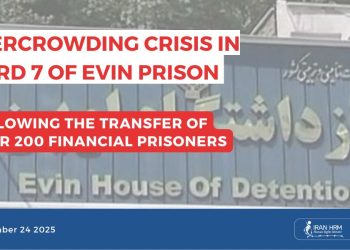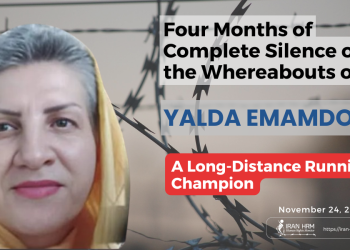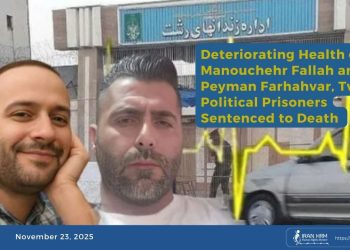Over the past month, Saeed Masouri has been summoned twice to the office of the ward chief, where he was directly threatened with death by agents of the Ministry of Intelligence.
Wednesday, July 16, 2025 – Qezel Hesar Prison in Karaj witnessed a sudden and violent raid. Security agents stormed Unit 4, where political prisoners are held, in an attempt to transfer Saeed Masouri — one of Iran’s longest-held and most well-known political prisoners — to an unknown location without presenting any judicial warrant. The assault was met with collective resistance from the political prisoners, ultimately forcing the agents to retreat after clashes and rising tensions.
Heavy Security Atmosphere in Qezel Hesar Prison
Well-informed sources from inside the prison have confirmed that following the raid, a heavy security atmosphere has taken hold over the political prisoners’ ward. Special Guard forces have been stationed in the prison yard, and there is a continued risk of another attack aimed at abducting Saeed Masouri or cracking down on the inmates. This incident comes amid a new wave of repression targeting political prisoners across Iran, as judicial and security authorities accelerate executions and extrajudicial summonses under the pretext of “wartime conditions.”
Risk of Execution for Three Other Political Prisoners
In addition to the death threats against Saeed Masouri, three other death-row political prisoners are being held in the same ward, and their situation is also extremely concerning.
Behrouz Ehsani and Mehdi Hassani have had their requests for retrial rejected for the fourth time, and the risk of execution at any moment is imminent.
Abolhassan Montazer, another political prisoner sentenced to death, has been held for months in a state of complete uncertainty regarding his fate.

Human rights activists warn that alongside the attempted abduction of Saeed Masouri, the likelihood of these death sentences being carried out has also increased.
Direct Threats to Saeed Masouri’s Life
According to verified reports, Saeed Masouri was summoned twice over the past month to the office of the ward chief, where he was directly threatened with death by Ministry of Intelligence agents. Simultaneously, his family has also come under security pressure and received threatening phone calls. These developments have heightened concerns about a possible forced transfer or even enforced disappearance of this political prisoner.
Saeed Masouri: 25 Years in Prison Without a Single Day of Leave
Saeed Masouri, born in 1965 in Khorramabad, is one of the longest-held political prisoners in Iran. Since his arrest in January 2001, he has been imprisoned without being granted a single day of furlough. Prior to his arrest, he was a medical student in Germany and Norway. Upon returning to Iran, he was arrested in the city of Dezful on charges of “collaboration with the People’s Mojahedin Organization of Iran (PMOI).”
After enduring 14 months of interrogation in solitary confinement—first in the Intelligence Ministry’s detention center in Ahvaz, then in Ward 209 of Evin Prison—he was initially sentenced to death. This sentence was later commuted to life imprisonment. Over the past 25 years, Masouri has gone on hunger strikes multiple times to protest inhumane prison conditions, discrimination, physical and psychological torture, and the denial of basic rights. He has consistently been denied access to medical care, phone calls, education, and furlough, and has been under constant pressure from security forces.
Transfer of Bijan Kazemi to Intelligence Ministry’s Safe House in Qom
Bijan Kazemi has reportedly been transferred to a “safe house” operated by the Ministry of Intelligence in the city of Qom.
Uncertainty for Political Prisoners Karim Khoshjah and Yaghoub Derakhshan in Lakan Prison
Political prisoners Karim Khoshjah and Yaghoub Derakhshan remain in a state of legal limbo in Lakan Prison in Rasht, facing the serious charge of baghi (armed rebellion).
Violent Transfer Back to Qezel Hesar
In August 2023, Saeed Masouri was transferred to Evin Prison. However, only a month later, he was violently returned to Qezel Hesar Prison in Karaj following a raid by special guard forces. Qezel Hesar is one of Iran’s most overcrowded and brutal prisons, with widely reported poor sanitary, living, and security conditions. Masouri is currently being held in Unit 4 of the prison’s political ward, under constant pressure and threats from security agents. His life is now at greater risk than ever before.
New Wave of Repression Against Political Prisoners
These events are part of a broader and intensifying crackdown on political prisoners across Iran. In recent weeks, numerous political, civil, and social activists have been arrested in various cities. At the same time, the number of death sentences issued for political prisoners and protesters has risen, along with mounting pressure on their families.
Judicial and security authorities appear intent on creating a climate of fear and intimidation to silence any form of dissent. Ghezel-Hesar and several other prisons in the country have effectively become centers for the enforcement of repressive state policies.
Reaction of Human Rights Activists
Human rights defenders and international organizations have warned that any harm or assault against Saeed Masouri would constitute an extrajudicial killing, with direct responsibility resting on the judicial and security authorities of the ruling dictatorship. They stress that the international community must not remain silent in the face of threats to the lives of political prisoners.
Amnesty International and UN Special Rapporteurs on human rights have repeatedly called for the immediate release of Saeed Masouri and other political prisoners, describing his continued detention as a clear violation of international and human rights law.
Saeed Masouri’s Life in Immediate Danger
All evidence indicates that the attempt to transfer Saeed Masouri to an unknown location may be a prelude to intensified pressure or even his physical elimination. The direct threats, the raid on the political ward, and the heavy security atmosphere point to a coordinated plan to suppress and punish prisoners who refuse to remain silent or submit.
Civil society activists and families of political prisoners have urgently called on human rights organizations and independent media to support Saeed Masouri and other prisoners at risk.
Universal Declaration of Human Rights
Grave Human Rights Violations in the Case of Saeed Masouri and Political Prisoners at Qezel Hesar
The raid, death threats, forced transfer attempts, and security pressures against Saeed Masouri and other political prisoners in Ward 4 of Qezel Hesar Prison constitute a clear and systematic violation of human rights in Iran. The most serious violations include:
Right to life and personal security (Article 3 of the UDHR): The direct threat to Saeed Masouri’s life and the imminent execution risk for other inmates blatantly violate this fundamental right.
Prohibition of torture and inhuman treatment (Article 5 of the UDHR & Convention Against Torture): Threats, fear tactics, and inhumane prison conditions amount to psychological torture and cruel, degrading treatment.
Right to a fair trial (Articles 10 and 11 of the UDHR): Attempted transfers without court orders and repeated rejection of retrial requests for death row prisoners violate the right to due process.
Right to freedom of opinion and expression (Article 19 of the UDHR): Saeed Masouri’s prolonged imprisonment solely for his political and ideological beliefs is a clear suppression of freedom of expression.
Right to humane conditions in detention (Nelson Mandela Rules): Denial of medical care, furlough, and other basic rights violates the minimum standards for the treatment of prisoners.
These violations show that the treatment of political prisoners in Iran not only breaks domestic laws but also contravenes fundamental principles of human rights and binding international instruments. Immediate international response is needed.
Help us be the voice of the prisoners — share any information you can!







